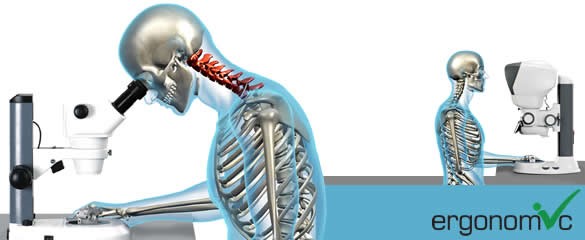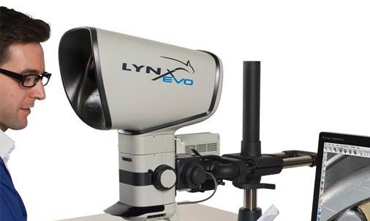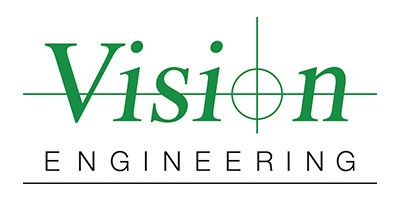Eyepiece-less Stereo Microscope
Eyepiece-less Stereo Microscope
DESCRIPTION
An advanced eyepiece-less stereo microscope for intricate tasks requiring stunning high-resolution 3D stereo viewing. Lynx EVO delivers outstanding optical performance with unrivalled ergonomics to power your productivity for forensic examinations.
The eyepiece-less optics of Lynx EVO significantly increase head freedom and eye relief, reducing operator stress and fatigue over long periods of time. Optimal operator ergonomics minimises the risk of repetitive strain-related injuries.
A small movement of the eye no longer means losing part of the field of vision – users can simply move their eyes to view the full image area, rather than the fixed head position required to operate within the constraints of narrow conventional microscope eyepieces.
The patented optics of Lynx EVO provides a large viewing area with an optical, three-dimensional high resolution image, not the two-dimensional digital image of video or camera scopes.
BASIC TECHNICAL DATA:
- Modular design allows tailoring for individual applications.10:1 zoom ratio provides 6x - 60x magnification, increasing to 240x with supplementary lenses.
- Integrated HD camera/software (option) provides seamless image/video capture and annotation capabilities.
- Long working distance for easy sample manipulation.
- Flexible stand options, ideal for industrial and life science applications.
- 8-point LED ring light with intensity control.
- in-built rotating diffuser for contrast adjustment.
- 5-point LED transmitted (sub stage) illumination (option).
- Best Hands to eye coordination
- No Need to remove spectacles
- Freedom of Head Movement during inspection
Difference between Eyepiece less Stereo Zoom 3D Imaging Microscope and Normal Stereo Microscope
 Improving microscope ergonomics is not just about improving comfort of the operator, but has many benefits to the organisation such as reducing absenteeism and increasing productivity.
Improving microscope ergonomics is not just about improving comfort of the operator, but has many benefits to the organisation such as reducing absenteeism and increasing productivity.
What is ‘ergonomic’?
'Ergonomics' is the science of designing environments and products to match the individuals who use them
Source: GGI Office Furniture (UK) Ltd
The word 'ergonomics' comes from the Greek words 'ergon' meaning 'work' and 'nomos' meaning 'natural law'.
The ergonomics of a microscope has a major impact on operator productivity, the resulting quality of work, as well as therefore incurring additional costs as a result of lost time, increased wastage, operator fatigue, or illness etc.
But an ergonomic microscope is not about improving adjusting the seat height, or eyepiece position to improve body position. Yes, microscope ergonomics concerns the comfort of the operator, but it also to do with improving eye fatigue, hand-to-eye co-ordination, efficiency and time saving, accuracy and error rates and many more factors.
Ergonomic working position
With greater emphasis on working conditions and occupational health practices prioritised increasingly in the work place, an ergonomic body position is fundamental in retaining comfort throughout the day.
If using a microscope in the work place, an ergonomic position not only makes the instrument more comfortable , it is also less fatiguing and, more importantly, much easier to use. Additionally, optimal operator ergonomics minimises the risk of repetitive strain-related injuries.
Ergonomics of posture

- Ergonomic working position
- Increased user comfort
- Reduced strain on neck
- Reduced time lost to injuries / discomfort caused by poor posture
Freedom of head movement
When viewing subjects under the microscope for any length of time, users often have to hold a fixed viewing position which can lead to stiffness in the neck muscles.
A key benefit of Vision Engineering’s eyepiece-less optical technology is that users do not need to precisely align their eyes with the eyepieces. This freedom of movement allows the muscles to be more relaxed and so reduces associated neck and back strain associated with the fixed body position of conventional microscope eyepieces.
- Freedom of head movement
- Increased user comfort
- Extended comfortable working
- Increased quality of observations
A natural view of the subject
With traditional microscope eyepieces, operators must position their eyes very close to the eyepieces, blocking out ambient light. The intense light exiting the eyepieces causes the pupils to contract. Constant contraction and expansion of the pupils is the main cause of eye fatigue with microscopes.
With eyepiece-less microscopes, users sit back from the viewing lens, allowing ambient light into the eyes. Additionally, the light exiting the eyepieces is spread over a larger area, providing a more natural view of the subject.
Ability to wear glasses
If operators using a microscope usually wear spectacles (glasses) for activities such as working at their PC, they often need to remove them when looking through a microscope so they can align their eyes correctly with the eyepieces.
The advantage of the ‘eyepiece-less’ microscopes means operators can continue to use their glasses) when inspecting or observing through the viewer. Operators do not need to remove their glasses (or safety glasses) to use the microscope.
Easy hand-eye-co-ordination
Critical for re-work, repair, dissection and other manipulation tasks, hand-eye co-ordination is essential for these activities, particularly for accuracy and manoeuvrability of tools and subjects.
With Vision Engineering’s patented microscope viewing heads, operators can sit back from the eyepieces, gaining a much better peripheral vision, so they can co-ordinate hands in a natural manner.
Ergonomic microscopes
Not all “ergonomic” microscopes can offer the full range of ergonomic benefits that are possible with Vision Engineering’s eyepiece-less microscopes. That’s why businesses choose Vision Engineering’s unique ergonomic solutions because they know their operators will be more efficient, more accurate and more productive. So the operator benefits and so does the business.
Unique Advantages of Dynascopes

Factors
- Seat height
- Bench height
- Sample size
- Eye point
- User height
- Power supply position
- Glare shield position
- Access to tools


